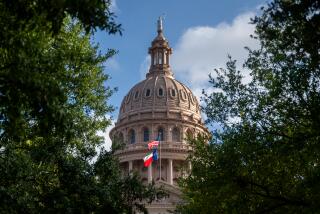Debate Constraints
Mr. Bill Ritter’s Nov. 16 column, “Newsman’s Great Expectation Shattered,” detailing his disenchantment with political forums, should help dispel the myth and unwarranted expectations that a camera is the catalyst to a great debate. Mr. Ritter wants to disembark from what he calls the bus of politics after two short rides moderating Assembly candidate forums on KPBS-TV (Channel 15).
Before Mr. Ritter climbs down from this proverbial bus, I, as a participant in one 30-minute forum, would like to thank him for his fine work and interest. I think he did an excellent job. As for his shattered expectations--perhaps he expects too much magic from the television medium.
KPBS plays a crucial role in informing the electorate on local elections, often providing voters with their only opportunity to consider the local candidates’ stances on a myriad of issues and ballot measures. While that program was no doubt useful in the Assembly forums, the format may have been too restrictive to spark a discussion, let alone “The Great Debate” Mr. Ritter expected.
Consider this: The time allotted for the forum was 30 minutes, allowing each participant, including the moderator, six minutes of air time. Ideally, then, each candidate had eight opportunities to provide 45-second responses (the time allotted to many television commercials) on broad-ranging and often complex issues. Allow me to repeat some of the questions: How do you plan to solve California’s insurance crisis? What is your stance on the toxics initiative, Proposition 65? Forty-five-second responses are not going to do much but hint at the real solutions.
The questions were passed from one candidate to the next and, in deference to time, the discussion jumped from one topic to the next, choking off potential debate. Candidates had minimal opportunity to discuss the issues let alone counter one philosophy with another.
Mr. Ritter dealt with those constraints admirably and did evoke some constructive responses to each of his questions for the voters trying to decide who they would like to have representing them in Sacramento.
The forum, though, was no “Great Debate.” It never could have lived up to Mr. Ritter’s great expectations. But perhaps experimenting with the format will make it more accommodating to the “cerebral stuff, the Great Debate, the mashing of philosophies, of politics, of what people really believe in,” to borrow Mr. Ritter’s words.
ASSEMBLYWOMAN LUCY KILLEA
San Diego
More to Read
Get the L.A. Times Politics newsletter
Deeply reported insights into legislation, politics and policy from Sacramento, Washington and beyond. In your inbox three times per week.
You may occasionally receive promotional content from the Los Angeles Times.






